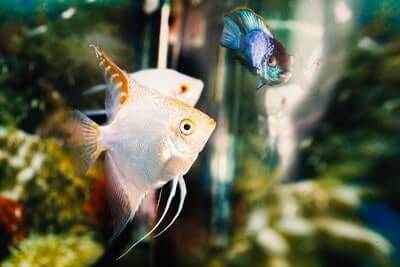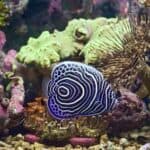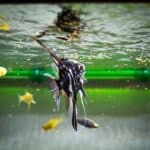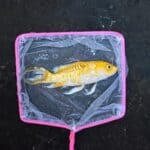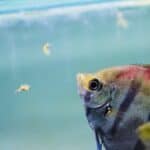Angelfish are perceived as aggressive, cannibalistic, and prone to eating other fish. This can leave you wondering if adding angelfish to a fish tank is safe.
Angelfish are part of the cichlid family, which eat other fish and each other.
That said, angelfish are one of the least aggressive types of cichlid. They’re also piscivores. Even if they aren’t hungry, they may consume other fish due to territorial disputes or stress.
You may find that angelfish are eating their eggs or fry, chewing on the fins of other fish, cannibalizing dead fish, and consuming fish poop.
You can limit damage by keeping tank conditions well-balanced and limiting stress.
Do Angelfish Eat Other Angelfish?
Angelfish eat other fish and those of their species because they’re piscivores.
Fish are a normal part of their diet, as they hunt and consume other fish in the wild to gain nutrients. Even in domestic settings, this hunting instinct remains.
Most fish keepers categorize angelfish as “semi-aggressive” as they’re a part of the cichlid family.
These are a type of freshwater fish known to be highly aggressive. Common aquarium angelfish isn’t as hostile as other cichlids, but angelfish still eat any fish that fits in their mouths.
This includes any smaller fish. Also, angelfish are territorial, so males fight by biting and headbutting each other. If the territorial dispute gets out of hand, this can result in one eating the other.
Since angelfish eat meat, you must be selective with their tankmates to stop them from turning their companions into prey. It doesn’t matter how much food you give them or what type.
Why Do Big Fish Eat Small Fish?
Bigger fish eat smaller fish. Like any other living organism, angelfish have an instinctual need to survive. They’ll act in self-interest, even if it means eating another species of fish or one of their species.
A common belief is that big fish only eat small fish if they aren’t sufficiently fed, but this is untrue. There are many reasons why fish eat each other, including:
Territory
Some fish are territorial, while others crave good territory but won’t viciously defend it.
Regardless, all fish prefer staying in areas where they’re safe from predators and their kind can live together peacefully. If there are smaller fish in the territory, they’ll be eaten by bigger fish.
This is especially common with species like angelfish, where the females will procreate with males that have the best territory. This encourages the males to clear the area by any means, including cannibalism.
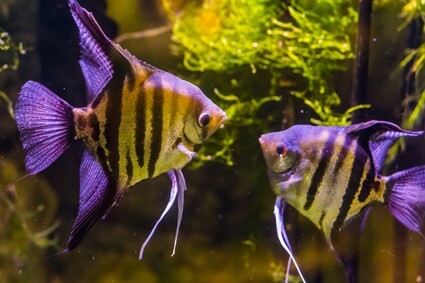
Resources
Fish need sufficient food and space for brood care and development.
If other, smaller fish prevent this from happening, larger fish may eat them. Likewise, if the small fish act as food the bigger fish need, they’re easy pickings.
Protection
Angelfish are monogamous, forming long-term relationships with their mates.
Mated fish pairs have been shown to protect each other from predators and threats. This can lead to big fish eating smaller fish, which could otherwise be considered a threat.
Are Angelfish Dangerous To Keep With Other Fish?
Angelfish eat other tankmates, depending on their size.
Because of this, you may think it’s best to leave angelfish isolated in a tank of their own. That’s a simple solution, but it’s also unhealthy for the angelfish.
Applied Animal Behavior Science researched how well certain fish do in community tanks. As it turns out, freshwater angelfish show an increase in welfare when in community tanks with other groups of fish.
The study noted an increase in shoaling. This occurs when fish group up together and swim synchronized.
Besides keeping a beautifully varied aquarium, this increases the lifespan of your angelfish. They’re healthier and more energetic in groups.
Are Angelfish Cannibals?
Angelfish can be aggressive, even toward each other, but it’s not their first choice. If given other options, angelfish will eat their kind last.
Cannibalization usually happens in the following situations:
- The smaller angelfish can fit in the larger fish’s mouth.
- The angelfish conflict with each other during mating or territorial disputes.
An exception is with angelfish fry (babies) and eggs. Angelfish are mostly known as filial cannibals; filial cannibalism refers to an adult of any given species eating their offspring.
There are two types of filial cannibalism:
- Total filial cannibalism: Parents eat their entire brood.
- Partial filial cannibalism. Parents eat only a portion of the offspring.
The most common reason for total filial cannibalism is ignorance, which often happens to new parents.
Do Angelfish Eat Their Babies?
When a pair of angelfish have their first brood, both parents will often eat up all the eggs.
They don’t know better and believe the eggs are just a snack. Angelfish usually cease this behavior when the 3rd or 4th brood comes around.
As for partial filial cannibalism, the males will sometimes eat a portion of the eggs to get the females ready to breed faster.
Both types of cannibalism can have benefits, such as:
- Ensuring there will be sufficient resources for the remaining fry
- Putting pressure on the living fry to develop faster
- Eating the offspring for nutrients allows the parents to stay healthy enough to have more babies
- Lowering mating competition
- Ensuring stronger offspring have the space to succeed
Filial cannibalism is regarded as an intentional product of evolution, which even applies to domestic fish. Angelfish have been bred and kept by aquarists for over 60 years. Nonetheless, they still display certain tendencies you would commonly see in the wild.
According to the Institute for Evolutionary Biology and Ecology, male fish are likelier to consume younger eggs. In the study, when fish were presented with mixed broods of older and younger eggs, the male fish would cannibalize the younger ones.
From an evolutionary perspective, this makes sense. The parents want to ensure that the eggs that survive are those further along in development.
That’s because these are also the ones most likely to live. This study also revealed that fish could recognize and differentiate between the different developmental stages of their brood.
How Do I Keep My Angelfish From Eating Each Other?
Angelfish may eat their children or other fish, no matter the conditions.
Any aquarium is at risk, even if it offers:
- Ample food.
- A safe environment.
- Clean and balanced water.
- Minimal competition.
- Privacy.
Some angelfish do this because it is ingrained in their biology. Aside from that, stress is the biggest external element that causes angelfish to eat their kind. When anxious, angelfish will feel threatened and eat in a state of panic.
Let’s look at the stressors you can watch out for.
Movement
Pay attention if your angelfish belongs to:
- A large tank with many other angelfish.
- A community tank with different types of fish.
In both cases, the movement of the other fish can be a source of stress. Angelfish are heavily involved in the development of their fry.
They look out for the babies until they can swim freely. While waiting for the eggs to hatch, angelfish will be on high alert.
Excessive movement from over-excited fish will make your angelfish anxious. Any activity outside the tank, like people passing, can upset the fish.
Constant Change In Their Environment
Frequent changes in the angelfish’s environment aren’t good for its well-being, as this can stress it to the point of cannibalizing its species or other fish.
Stressful changes include:
- Changing the tank water too often.
- Moving around and changing the aquarium plants.
- Adding new fish to the tank.
Improper Tank Conditions
Angelfish need their tank to be a specific size to thrive. To avoid undue aggression, be sure to check that they have sufficient space.
Likewise, you should monitor the tanks:
- Water temperature.
- Oxygen levels.
- Cleanliness.
- Water pH and other balancing factors.
Aggressive Fish
Fish displaying aggressive behavior and fighting with each other can easily upset the other fish in the tank, especially in angelfish-only tanks.
Unpaired male angelfish will fight for mating opportunities, causing aggression across the population. This is dangerous for fry since it leaves the mated angelfish parents in a stressful environment.
Parental Stress
Female angelfish tend to become more aggressive when pregnant. Altercations between pregnant angelfish and the other tank mates will wear down the fish in the tank.
Likewise, angelfish often move their eggs from the initial laying spot to the safer side of the tank. Being unable to find a safe place for their babies is difficult for any parent, resulting in added aggression.
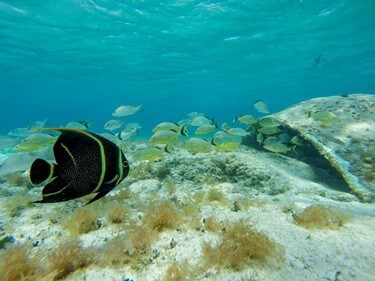
Do Angelfish Eat Fish Tails and Fins?
If you have living fish with small tears in their fins and tails, it’s possible the angelfish got to them. Most fish eat the body parts of dead fish for sustenance.
However, angelfish will nip at the extremities of live fish due to aggression. In this case, it’s best to separate the injured fish until it recovers.
Angelfish are most likely to exhibit this behavior if they’re:
- Paired angelfish are trying to protect their mate or offspring.
- Males are trying to establish a hierarchy.
- Stressed out.
- Gravid.
- Fighting for territory.
Do Angelfish Eat Fish Poop?
If you ever see your angelfish rush to gobble up fish poop, this behavior is normal. Fish are opportunistic feeders that will look for any source of nutrients, including eating the feces of other fish. Even when well-fed by their owners, fish will still take advantage of their environment.
They may feast on the following:
- Feces.
- Fins.
- Dead bodies of other fish.
Prevent your angelfish from eating the fins of tank mates. As for dead bodies and poop, angelfish shouldn’t be allowed to eat the body or poop of an infected fish.
Monitor the health of all the fish in your tank. If one dies of a bacterial infection, the other fish that eat its feces and body will be infected.
How to Prevent Angelfish From Eating Other Fish
To keep your angelfish peaceful, reduce their stress levels. This can be done by:
- Positioning the tank in a corner of the room where there’s not too much movement or sound.
- Changing their water only as much as needed (every 2-4 weeks, depending on the number of fish).
- Feeding them properly (2-3 times daily, depending on their size).
- Angelfish grow large, so keep them in a big fish tank (at least 15 inches deep).
- Add the right aquarium plants so the angelfish have a place to lay their eggs.
- Ensure that the temperature in the tank is right (between 78 and 83 degrees Fahrenheit.
- Use a stress coat to remove chemicals from the tank and help the fish heal from skin and fin injuries.
- If you have a community tank, remove all other fish except for the breeding pair.
- Don’t overcrowd the aquarium.
- Don’t introduce new fish to the aquarium over short periods.
- Keep an eye out for any tears in their fins, changes in color, and other physical ailments.
- Keep the lights dim and constant near the tank, as changing lighting unsettles them.
- Test the quality of the water to make sure the pH balance is optimal.
Fish eating other fish is expected. Angelfish may be aggressive, but reducing stress will prevent them from eating other fish and each other.

